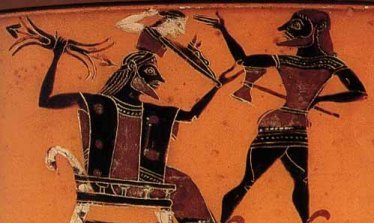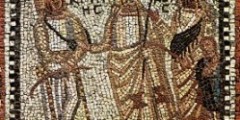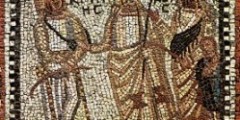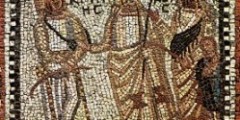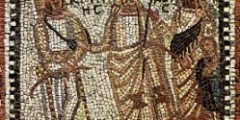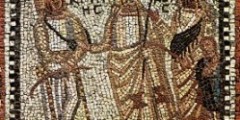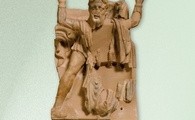Nativity plays (striking a seasonal note)
December 17, 2012
If you’ve got dozens of gods and goddesses, who didn’t exist from eternity but came into being by a procreative process (though they didn’t necessarily have both a father and a mother, and weren’t necessarily born in the conventional manner), you’re likely to have some interesting divine birth stories; and if you also have a …
From Mount Sinai to Michigan: the rediscovery of Menander’s Epitrepontes (Postscript)
December 13, 2012
Just as I thought I had finished with the subject, comes news of yet another little papyrus fragment of Epitrepontes, again in the Michigan collection, again published by Cornelia Römer in the Zeitschrift für Papyrologie und Epigraphik (volume 183, pages 33-36). This little scrap, just 70mm long and 30mm across at its widest point, contains …
From Mount Sinai to Michigan: the rediscovery of Menander’s Epitrepontes (part 4)
December 6, 2012
The ten new papyrus fragments of Menander’s Epitrepontes that have been published during the last forty years have added very considerably, but rather unevenly, to our knowledge of all five acts of the play. One contains small parts (never more than eight letters) of about 70 lines from Act One; not much can be understood, …
From Mount Sinai to Michigan: the discovery of Menander’s Epitrepontes (part 3)
November 29, 2012
From Mount Sinai to Michigan: the recovery of Menander’s Epitrepontes (part 3) The fifth-century manuscript from Aphroditopolis in Upper Egypt, which came to light in the first decade of the twentieth century, proved to have had a chequered history. Some hundred years after it had been written, its then owner, a man named Flavius Dioscorus, …
From Mount Sinai to Michigan: the rediscovery of Menander’s Epitrepontes (part 2)
November 22, 2012
At St Catherine’s monastery on Mount Sinai, in 1844, Constantin von Tischendorf discovered two leaves of a manuscript containing dramatic dialogue. But they were glued into the cover of another book, and he could only read one side of each leaf. So he did, and took a transcript away with him. And nothing happened; the …
From Mount Sinai to Michigan: the rediscovery of Menander’s Epitrepontes (part 1)
November 15, 2012
Menander’s comedy Epitrepontes (The Arbitration) is an exquisitely constructed drama in which a baby, reluctantly abandoned by his mother to preserve her reputation and her five-month-old marriage, is reunited with his parents by a process to which almost every character in the play makes an essential contribution (often an unintentional one). Virtue repeatedly earns its …
Elections and divine wrath
November 9, 2012
In the last week before the US election, a storm of almost unprecedented violence (Hurricane Sandy) caused great devastation and loss of life, especially in New York and New Jersey. The election was held on Tuesday 6 November, and a day or two later a second storm created further disruption in the same areas, with …
What goes wrong in Euripides’ Bacchae?
November 1, 2012
In Euripides’ tragedy The Bacchae, the god Dionysus brings terrible suffering on Thebes, the city of his birth, and on all the surviving relatives of his mother Semele. All the women of Thebes become possessed and flee to the mountains to perform orgiastic rituals in honour of Dionysus, led by Semele’s three sisters Agaue, Ino …
A new guide to Sophocles
October 25, 2012
Nottingham classicists have contributed three chapters to the new Brill’s Companion to Sophocles edited by Andreas Markantonatos – more than any other institution in the world. In this volume, which covers all aspects of Sophocles’ dramas and their reception, Patrick Finglass writes on Sophocles’ Ajax (which he edited for Cambridge University Press last year), Alan Sommerstein on …
Lysistrata the Warrior?
October 18, 2012
Aristophanes’ Lysistrata (see Two productions next year) is often thought of as a classic anti-war play. In Lysistrata the warrior Alan Sommerstein argues that this is a considerable oversimplification. Aristophanes’ heroine sees nothing wrong in warfare unless it is against the current enemy, Sparta, and even the war with Sparta is ended on terms that virtually amount …

